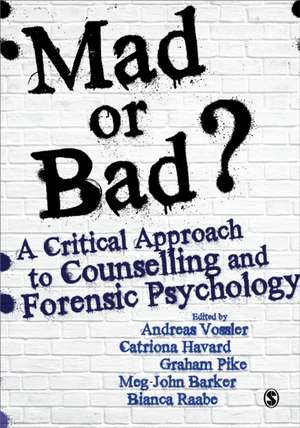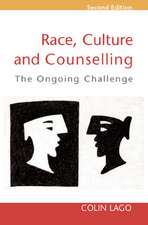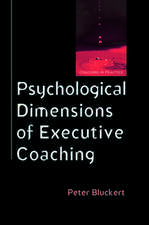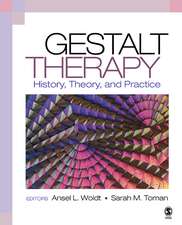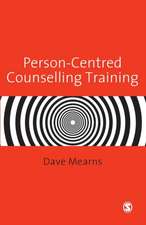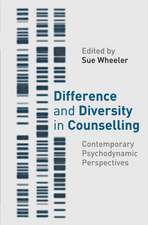Mad or Bad?: A Critical Approach to Counselling and Forensic Psychology
Editat de Andreas Vossler, Catriona Havard, Graham Pike, Meg-John Barker, Bianca Raabeen Limba Engleză Paperback – iun 2017
· Part 1 explores the predominant tensions between forensic and therapeutic agendas;
· Part 2 considers how criminal and ‘insane’ identities and careers may be considered gendered, classed, culturally and age-dependent experiences, and be related to power and oppression;
· Part 3 examines issues around sex and sexuality in forensic and therapeutic settings;
· Part 4 introduces a range of therapeutic approaches for working with offenders and victims of crime;
· Part 5 covers forensic and therapeutic practices, including programmes for the prevention of both mental health issues and offending.
Edited by an expert team from the Open University and written by a broad range of contributors, this book draws on a wealth of experience in this popular subject area. It will be a key text for students of forensic psychology, counselling and psychotherapy, and for health and social care professionals working in therapeutic and forensic settings.
| Toate formatele și edițiile | Preț | Express |
|---|---|---|
| Paperback (1) | 302.84 lei 3-5 săpt. | +36.13 lei 4-10 zile |
| SAGE Publications – iun 2017 | 302.84 lei 3-5 săpt. | +36.13 lei 4-10 zile |
| Hardback (1) | 888.46 lei 6-8 săpt. | |
| SAGE Publications – 7 iun 2017 | 888.46 lei 6-8 săpt. |
Preț: 302.84 lei
Nou
Puncte Express: 454
Preț estimativ în valută:
57.96€ • 59.87$ • 48.23£
57.96€ • 59.87$ • 48.23£
Carte disponibilă
Livrare economică 04-18 martie
Livrare express 15-21 februarie pentru 46.12 lei
Preluare comenzi: 021 569.72.76
Specificații
ISBN-13: 9781473963528
ISBN-10: 1473963524
Pagini: 400
Dimensiuni: 170 x 242 x 22 mm
Greutate: 0.7 kg
Ediția:First Edition
Editura: SAGE Publications
Colecția Sage Publications Ltd
Locul publicării:London, United Kingdom
ISBN-10: 1473963524
Pagini: 400
Dimensiuni: 170 x 242 x 22 mm
Greutate: 0.7 kg
Ediția:First Edition
Editura: SAGE Publications
Colecția Sage Publications Ltd
Locul publicării:London, United Kingdom
Recenzii
While the title of the book will either attract or repel potential readers, undertaking a critical review of counselling and forensic psychology is to be welcomed. Contributions by expert psychotherapists and clinical, counselling and forensic psychologists working in a multiplicity of forensic settings alongside academics, many with practitioner experience, ensures that a range of views, disciplines and approaches are fully explored. With chapters covering issues such as media representations, identities, sexual offending, diagnosis, treatment, therapeutic practice and prevention, this book is a highly recommended read for students, academics and practitioners interested in mental health and its relationship with criminality.
This collection sheds new light on the problems of people with mental health difficulties in the criminal justice system. It carefully shows that we cannot just label people as "mad" or "bad" but must instead consider a complex set of interacting social, psychological, legal and circumstantial factors, in order to understand how people become caught up in crime. This outstanding book will be essential reading for students or anyone interested in the complicated relationship between mental health, contemporary social life and criminal justice.
A quite remarkable and very well-researched book, in both its range and depth of exploring how our legal and psychiatric systems are used to control people who are different. The tensions between punishment and treatment are thoroughly examined. Critical socio-psychology at its finest!
This collection sheds new light on the problems of people with mental health difficulties in the criminal justice system. It carefully shows that we cannot just label people as "mad" or "bad" but must instead consider a complex set of interacting social, psychological, legal and circumstantial factors, in order to understand how people become caught up in crime. This outstanding book will be essential reading for students or anyone interested in the complicated relationship between mental health, contemporary social life and criminal justice.
A quite remarkable and very well-researched book, in both its range and depth of exploring how our legal and psychiatric systems are used to control people who are different. The tensions between punishment and treatment are thoroughly examined. Critical socio-psychology at its finest!
Cuprins
Part I: Mad or bad? - Setting the scene
Working therapeutically in forensic settings - Andreas Vossler, Catriona Havard, Meg-John Barker, Graham Pike, Bianca Raabe and Zoe Walkington
Historical overview - Catriona Havard and Katherine D. Watson
Media representations - Troy Cooper and Simon Cross
Diagnosis and categorisation - David Pilgrim
Part II: Mad/bad identities
Race - Hári Sewell
Gender - Jane E.M. Callaghan and Joanne H. Alexander
Age - Emily Glorney
Class - Daniel Holman
Part III: Sex and sexuality in mental health and crime
Sexual assault and abuse - Tara N. Richards and Joan A. Reid
Sex and sexuality in the therapy room - Amanda O'Donovan
‘Paraphilias’ - Jemma Tosh
Sex work - Allan Tyler
Part IV: Treatment
Attachment-based approaches - Mary Haley
Cognitive behavioural therapy - Matt Bruce
Systemic approaches - Andreas Vossler, Brigitte Squire and Clare Bingham
Mindfulness - Meg-John Barker and Troy Cooper
Part V: Dichotomies in forensic and therapeutic practice
Memory - Nadia Wager
Self-harm and suicide - Andrew Reeves and Paul Taylor
Contexts - Henry Strick van Linschoten
Prevention - Nadia Wager and Graham Pike
Working therapeutically in forensic settings - Andreas Vossler, Catriona Havard, Meg-John Barker, Graham Pike, Bianca Raabe and Zoe Walkington
Historical overview - Catriona Havard and Katherine D. Watson
Media representations - Troy Cooper and Simon Cross
Diagnosis and categorisation - David Pilgrim
Part II: Mad/bad identities
Race - Hári Sewell
Gender - Jane E.M. Callaghan and Joanne H. Alexander
Age - Emily Glorney
Class - Daniel Holman
Part III: Sex and sexuality in mental health and crime
Sexual assault and abuse - Tara N. Richards and Joan A. Reid
Sex and sexuality in the therapy room - Amanda O'Donovan
‘Paraphilias’ - Jemma Tosh
Sex work - Allan Tyler
Part IV: Treatment
Attachment-based approaches - Mary Haley
Cognitive behavioural therapy - Matt Bruce
Systemic approaches - Andreas Vossler, Brigitte Squire and Clare Bingham
Mindfulness - Meg-John Barker and Troy Cooper
Part V: Dichotomies in forensic and therapeutic practice
Memory - Nadia Wager
Self-harm and suicide - Andrew Reeves and Paul Taylor
Contexts - Henry Strick van Linschoten
Prevention - Nadia Wager and Graham Pike
Descriere
This book takes a new and innovative approach to looking at the commonalities and disparities between counselling/psychotherapy and forensic psychology. It aims to develop a critical understanding of the themes and issues related to crime and therapy that are highly relevant to theory and practice, yet are often ignored or neglected.
